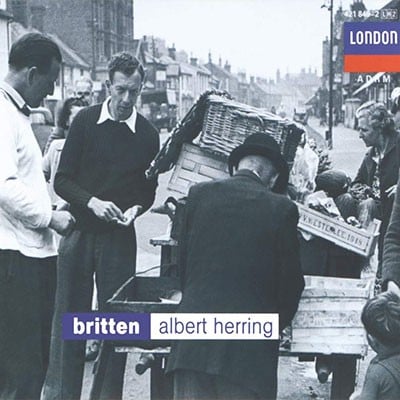Libretto by Eric Crozier, freely adapted from a short story of Guy de Maupassant (E,Bg,F,Fl,Fn,G,H,I,P,Sw)
2S,2M,A,2T,2Bar,B; Children's roles:Tr,2S
1(=picc,afl).1.1(=bcl).1-1.0.0.0-perc(1):timp/SD/TD/BD/tgl/cyms/cast/
tamb/gong/bells/glsp/whip/wdbl-harp-pft(=conductor)-
strings(1.1.1.1.1)
Abbreviations (PDF)
Boosey & Hawkes
Britten’s second chamber opera was composed just a year after its predecessor, The Rape of Lucretia, in 1947. Yet the contrast in style and subject matter could not be greater: instead of a tragedy based on a tale from Roman antiquity, Albert Herring is a comic opera set in the imaginary East Suffolk town of Loxford at the turn of the 20th century. The score contains some of Britten’s wittiest musical invention and his gifts for parody and caricature, already evident in Peter Grimes, are given full reign. However, the work is far from being mere farce: Albert is a sympathetic and credible figure who, tied to his mother’s apron-strings and frustrated by small-town pieties, embarks on a debauched ‘rake’s progress’, a theme fully in keeping with the composer’s favourite subject of the loss of innocence.
Moreover, such poignant touches as the third-act Threnody, in which Albert, presumed dead, is solemnly mourned by the gathered townsfolk, makes Donald Mitchell’s description of the opera as ‘a serious comedy’ seem completely apt.
Reproduced by kind permission of the Britten-Pears Library

Peter Pears/Sylvia Fisher/Johanna Peters/John Noble/Owen Brannigan/English Chamber Orchestra/Benjamin Britten
Decca 421 8492

